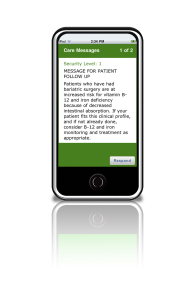 NaviNet's acquisition of Prematics earlier this month was motivated by NaviNet's desire to "extend itself beyond the desktop and into to the exam room via the physician’s smartphone," according to Chilmark Research analyst Cora Sharma.
NaviNet's acquisition of Prematics earlier this month was motivated by NaviNet's desire to "extend itself beyond the desktop and into to the exam room via the physician’s smartphone," according to Chilmark Research analyst Cora Sharma.
"With this acquisition, NaviNet is seeking to grow by 1) attracting more physicians, and 2) encouraging existing physician users to utilize the system in ways that are important to payers, i.e., in the exam room. These objectives make sense when considering how important mHealth is to the physicians’ workflow (based on research for [Chilmark's] report mHealth in the Enterprise, almost 90 percent of all physicians carry a smartphone)," Sharma wrote in a blog post.
Sharma argues that given American Medical Association comments surrounding low adoption of electronic medical records (EMR) among small physician practives, which remain uninspired by the HITECH Act, NaviNet recognized that the "only way to reach these doctors is through their mobile devices."
Sharma also argues that NaviNet saw an opportunity to increase use of its services among physicians while they were in the exam room if they pursued mobile: "During the physician-patient office visit, the physician is much more willing to use a mobile device than a desktop because it doesn’t interfere nearly as much with the doctor-patient interaction. Patients do not experience the decrease in eye contact caused by their doctor seated in front of an unmovable desktop screen, and are even impressed with cutting edge mobile technology," Sharma writes.
Pre-acquisition, Prematics' e-prescribing offering boasted a paltry 4,000 physician users. Prematics offered the service for mobile platforms including iPhone, iPod Touch, iPad, and Windows Mobile. While Sharma is confident this deal was motivated by NaviNet's desire to increase its mobile expertise, her general enthusiasm around mobile health is still tempered:
"While the NaviNet Prematics acquisition is a reflection of the optimism surrounding mobile technology as a solution, I remain skeptical that physicians will dutifully act on these messages, and even if they do, if patients will turnaround their behavior on the basis of an office visit."
For more of Sharma's analysis read the full post over at Chilmark Research



















